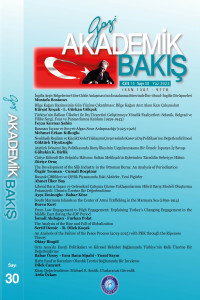Research Article
Year 2022,
Volume: 15 Issue: 30, 281 - 302, 15.06.2022
Abstract
Turkey has experienced a protracted conflict with the PKK since 1984. Over the history of almost 30 years of the violent conflict, the first comprehensive and overt peace attempt was launched by Turkish government in 2013. It had lasted for two years with great optimism and high expectations on reaching a political settlement before it failed in July 2015. This article aims to explore the reasons of the failure of 2013-2015 negotiations and examines whether conditions were suitable for launching a ‘peace process’ in 2013 to resolve Turkey’s conflict with the PKK. It draws on three main elements of Zartman’s Ripeness theory: mutually hurting stalemate (MHS), a formula for a way out and valid spokespersons. It is argued in the article that the conflict in Turkey was not in fact ripe enough for negotiations which were initiated and conducted hastily without any formula for way out and with problematic spokespersons.
References
- ABADIE, Alberto, and Javier Gardeazabal, “The economic costs of conflict: A case study of the Basque Country”, American Economic Review, Vol.93, No.1, 2013, 113–132.
- AKKAYA, Ahmet Hamdi, “The PKK’s Ideological Odyssey”, Journal of Balkan and Near Eastern Studies, Vol. 22, No.6, 2020. 730-745.
- AKP Booklet. “Questions and Answers to Democratic Opening Process.”, http://www.akparti.org.tr upload documents acilim220110.pdf.
- ALBAYRAK, Ayla, “Turkey’s Kurdish Peace Process: Parsing the Polls.” The Wall Street Journal.19.4.2013, https://www.wsj.com/articles/BL-250B-86
- ALJAZEERA, “Turkey releases PKK ‘peace’ group.”, 20.10.2009, https://www.aljazeera.com/news/2009/10/20/turkey-releases-pkk-peace-group
- AYDINLI, Ersel, Nihat Ali Özcan, “The Conflict Resolution and Counterterrorism Dilemma: Turkey Faces its Kurdish Question”, Terrorism and Political Violence Vol.23, No.3, 2011. 438-457.
- BBC TURKISH, “Salih Muslim: Türkiye’de PKK ile görüşmeler PYD’nin önünü açıyor.” 7.5.2013 https://www.bbc.com/turkce/haberler/2013/05/ 130506_salih_muslim
- BOOKCHIN, Debbie, “How My Father’s Ideas Helped the Kurds Create a New Democracy”, NYR Daily, 15.06.2018, https://www.nybooks.com/daily/2018/06/15/how-my-fathers-ideashelped- the-kurds-create-a-new-democracy/
- ÇANDAR, Cengiz, “The Transformation of Öcalan.” Al Monitor, 6.1.2013, https://www.al-monitor.com/originals/2013/01/turkey-kurds-pkk-peace.html
- CRISIS GROUP, No. 129, “Turkey: The PKK and a Kurdish Settlement.” 2012, https://www.crisisgroup.org/
Year 2022,
Volume: 15 Issue: 30, 281 - 302, 15.06.2022
Abstract
Türkiye, 1984’ten beri terör örgütü PKK ile çatışmaktadır. Yaklaşık 30 yıllık şiddetli çatışma tarihi boyunca, ilk kapsamlı ve açık barış girişimi Türk hükümeti tarafından 2013’te başlatıldı. Bu süreç iki yıl boyunca büyük bir iyimserlik ve yüksek beklentilerle devam etti ancak Temmuz 2015’te son erdi. Bu makale, müzakerelerin başarısız olmasının nedenlerini araştırırken Türkiye’nin PKK ile çatışmasını sonlandırmak üzere 2013’te bir ‘barış süreci’ başlatmak için koşulların uygun olup olmadığını incelemeyi amaçlamaktadır. Makale Zartman’ın “Olgunluk Teorisi”nin üç ana unsuru üzerine kurulmuştur: karşılıklı zarar veren tıkanma, çatışmadan çıkış için yol ve sözü geçen müzakereciler. Makalede, Türkiye’deki çatışmanın aslında hiçbir çıkış yolu formüle edilmeden ve sorunlu sözcülerle alelacele başlatıldığı ve koşulların müzakereler için yeterince “olgunlaşmadığı” ileri sürülmektedir.
References
- ABADIE, Alberto, and Javier Gardeazabal, “The economic costs of conflict: A case study of the Basque Country”, American Economic Review, Vol.93, No.1, 2013, 113–132.
- AKKAYA, Ahmet Hamdi, “The PKK’s Ideological Odyssey”, Journal of Balkan and Near Eastern Studies, Vol. 22, No.6, 2020. 730-745.
- AKP Booklet. “Questions and Answers to Democratic Opening Process.”, http://www.akparti.org.tr upload documents acilim220110.pdf.
- ALBAYRAK, Ayla, “Turkey’s Kurdish Peace Process: Parsing the Polls.” The Wall Street Journal.19.4.2013, https://www.wsj.com/articles/BL-250B-86
- ALJAZEERA, “Turkey releases PKK ‘peace’ group.”, 20.10.2009, https://www.aljazeera.com/news/2009/10/20/turkey-releases-pkk-peace-group
- AYDINLI, Ersel, Nihat Ali Özcan, “The Conflict Resolution and Counterterrorism Dilemma: Turkey Faces its Kurdish Question”, Terrorism and Political Violence Vol.23, No.3, 2011. 438-457.
- BBC TURKISH, “Salih Muslim: Türkiye’de PKK ile görüşmeler PYD’nin önünü açıyor.” 7.5.2013 https://www.bbc.com/turkce/haberler/2013/05/ 130506_salih_muslim
- BOOKCHIN, Debbie, “How My Father’s Ideas Helped the Kurds Create a New Democracy”, NYR Daily, 15.06.2018, https://www.nybooks.com/daily/2018/06/15/how-my-fathers-ideashelped- the-kurds-create-a-new-democracy/
- ÇANDAR, Cengiz, “The Transformation of Öcalan.” Al Monitor, 6.1.2013, https://www.al-monitor.com/originals/2013/01/turkey-kurds-pkk-peace.html
- CRISIS GROUP, No. 129, “Turkey: The PKK and a Kurdish Settlement.” 2012, https://www.crisisgroup.org/
There are 10 citations in total.
Details
| Primary Language | English |
|---|---|
| Subjects | Political Science, International Relations |
| Journal Section | Articles |
| Authors | |
| Early Pub Date | June 15, 2022 |
| Publication Date | June 15, 2022 |
| Published in Issue | Year 2022 Volume: 15 Issue: 30 |
Cite
Gazi Akademik Bakış Dergisi Creative Commons Atıf-GayriTicari 4.0 Uluslararası Lisansı ile lisanslanmıştır.


